Related Research Articles
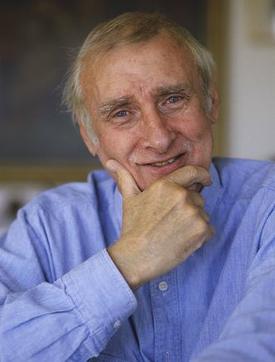
Terence Alan "Spike" Milligan was a British comedian, writer, musician, poet, playwright and actor. The son of an English mother and Irish father, he was born in British Colonial India, where he spent his childhood before relocating in 1931 to England, where he lived and worked for the majority of his life. Disliking his first name, he began to call himself "Spike" after hearing the band Spike Jones and his City Slickers on Radio Luxembourg.

The Goon Show is a British radio comedy programme, originally produced and broadcast by the BBC Home Service from 1951 to 1960, with occasional repeats on the BBC Light Programme. The first series, broadcast from 28 May to 20 September 1951, was titled Crazy People; subsequent series had the title The Goon Show.

Sir Samuel Morton Peto, 1st Baronet was an English entrepreneur, civil engineer and railway developer, and, for more than 20 years, a Member of Parliament (MP). A partner in the firm of Grissell and Peto, he managed construction firms that built many major buildings and monuments in London, including the Reform Club, The Lyceum, Nelson's Column and the new Houses of Parliament; which made him a millionaire.
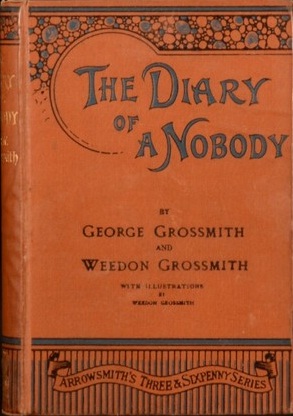
The Diary of a Nobody is an English comic novel written by the brothers George and Weedon Grossmith, with illustrations by the latter. It originated as an intermittent serial in Punch magazine in 1888–89 and first appeared in book form, with extended text and added illustrations, in 1892. The Diary records the daily events in the lives of a London clerk, Charles Pooter, his wife Carrie, his son William Lupin, and numerous friends and acquaintances over a period of 15 months.
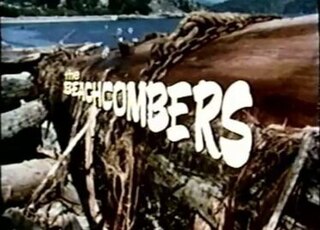
The Beachcombers is a Canadian comedy-drama television series that ran on CBC Television from October 1, 1972, to December 12, 1990. With over 350 episodes, it is one of the longest-running dramatic series ever made for English-language Canadian television.

Henry Canova Vollam Morton, was a journalist and pioneering travel writer from Lancashire, England. He was best known for his many books on London, Great Britain and the Holy Land. He first achieved fame in 1923 when, while working for the Daily Express, he covered the opening of the tomb of Tutankhamun by Howard Carter.
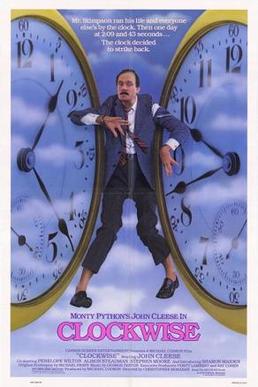
Clockwise is an absurdist 1986 British comedy road film starring John Cleese, directed by Christopher Morahan, written by Michael Frayn and produced by Michael Codron. The film's music was composed by George Fenton.
Wahome Mutahi was a humourist from Kenya. He was popularly known as Whispers after the name of the column he wrote for The Daily Nation from 1982 to 2003, offering a satirical view of the trials and tribulations of Kenyan life.
William Roland Hartston is an English journalist who wrote the Beachcomber column in the Daily Express. He is also a chess player who played competitively from 1962 to 1987 and earned a highest Elo rating of 2485. He was awarded the title International Master in 1972, but is now best known as a chess author and presenter of the game on television.
Surreal humor is a form of humor predicated on deliberate violations of causal reasoning, thus producing events and behaviors that are obviously illogical. Portrayals of surreal humour tend to involve bizarre juxtapositions, incongruity, non-sequiturs, irrational or absurd situations, and expressions of nonsense.
John Cameron Andrieu Bingham Michael Morton, better known by his preferred abbreviation J. B. Morton was an English humorous writer noted for authoring a column called "By the Way" under the pen name 'Beachcomber' in the Daily Express from 1924 to 1975.
Dominic Bevan Wyndham Lewis FRSL was a British journalist, author and biographer, known for his humorous newspaper articles.
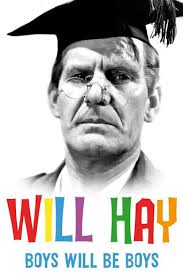
Boys Will Be Boys is a 1935 British comedy film directed by William Beaudine which stars Will Hay, Gordon Harker and Jimmy Hanley. The film is set at Narkover School, where headmaster Doctor Alec Smart becomes involved in the disappearance of a valuable necklace.

Julian Dean Chavasse Orchard was an English comedy actor. He appeared in four Carry On films: Don't Lose Your Head (1966), Follow That Camel (1967), Carry On Doctor (1967), and Carry On Henry (1971).

The Swiss Family Robinson: Flone of the Mysterious Island is an anime series produced by Nippon Animation.

The World of Beachcomber was a surreal television comedy show produced by the BBC inspired by the Beachcomber column in the Daily Express newspaper.
Major John Bernard Arbuthnot, MVO was a British soldier, banker, and journalist.
The fortnightly British satirical magazine Private Eye has long had a reputation for using euphemistic and irreverent substitute names and titles for people, groups and organisations and has coined a number of expressions to describe sex, drugs, alcohol and other aspects of human activity. Over the years these names and expressions have become in-jokes, used frequently in the magazine without explanation. Some have passed into general usage and can be found in other media and everyday conversation.
Sir Oliver Bury Popplewell is a British former judge and cricket player. He chaired the inquiry into the Bradford City stadium fire, presided over the libel case brought by Jonathan Aitken MP against The Guardian newspaper which eventually led to Aitken's imprisonment for perjury, and was widely reported for asking "What is Linford's lunchbox?" during a case over which he was presiding, brought by Linford Christie. He played first-class cricket for Cambridge University and was president of the Marylebone Cricket Club from 1994–96. He wrote a book about his legal career.
Arbuthnot Leasing International Ltd v Havelet Leasing Ltd [1990] BCC 636 is a leading UK insolvency law case, concerning a fraudulent transaction under the Insolvency Act 1986 section 423.
References
- ↑ P.G. Wodehouse: A Portrait of a Master, David A. Jasen, Music Sales Group, 2002, ISBN 0-8256-7275-9
- ↑ "Beachcomber lives again". Daily Express. 5 January 1996. p. 2.
- ↑ One story attributes it to the fact that he once commanded a canal barge.
- ↑ There is some inconsistency about her maiden name. One correspondent calls her "Florrie Palmer as was", but the narrator says that she was a Gurricle, from Crabhampton.
- ↑ J. B. Morton (1989) [1963]. Michael Frayn (ed.). The Best of Beachcomber. ISBN 0-434-79706-5.